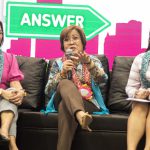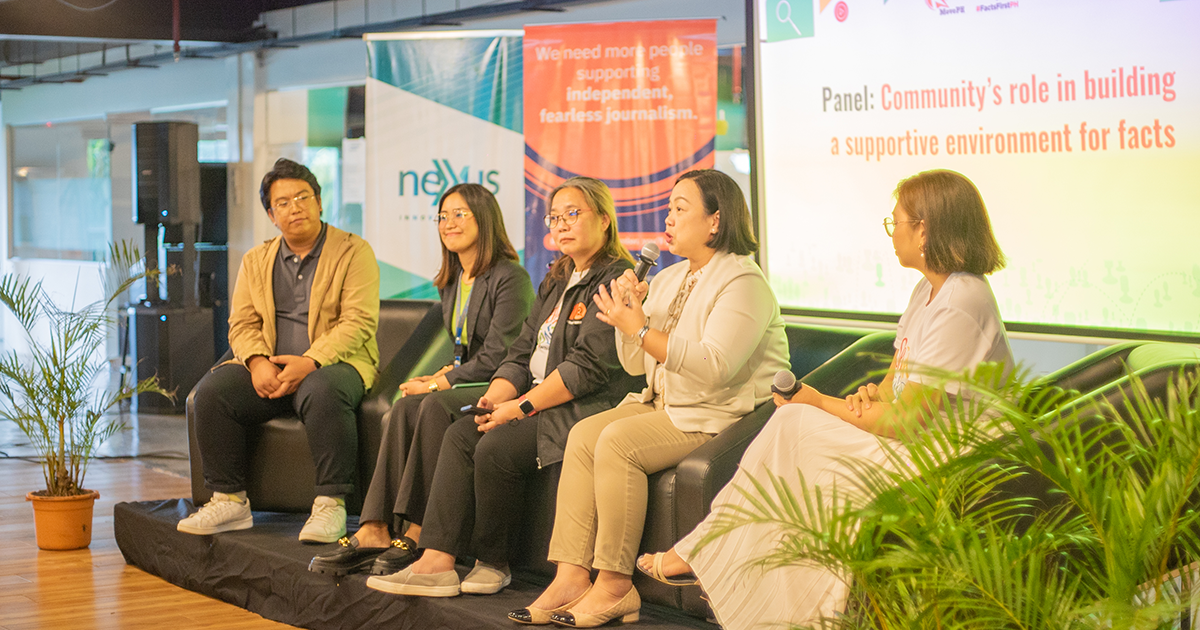
Rappler’s civic engagement arm, MovePH, kicked off the pilot launch of its #FactsFirstPH community learning series in Batangas at the De La Salle Lipa (DLSL) Nexus Auditorium, July 19.
With the theme “Understanding the digital world we live in and our role in it”, the event, which was the first of five training sessions, emphasized the fundamental concepts of responsible digital citizenship in combating disinformation in today’s world.
The session began with a talk on responsible digital citizenship and was followed by a panel discussion on fostering a culture of media and information literacy and accountability online.
Importance of responsible digital citizenship
As one of the guest speakers, Gemma Mendoza, the lead researcher on disinformation and platforms at Rappler, tackled the need to be responsible digital citizens by discussing the dark side of social media, the rise of generative AI technologies, the attacks on journalists or critical media, and the #FactsFirstPH movement.
Mendoza explained that though digital media serves as a powerful tool, there are various aspects to it that everyone should be concerned about.
“In the past, the gatekeepers were the journalists, the government, and the broadcast practitioners. Now it’s not us, the gatekeepers are actually the platforms we’re on. Why? They see everything. […] It’s the platforms that decide what you see. […] The problematic thing about this is [that] it doesn’t matter if it’s true or not,” she said.
To remind the young generation of the threats brought by several digital applications, she also talked about the prevalent advancement of generative AI technologies in the online world and the concerning effects they pose to a community.
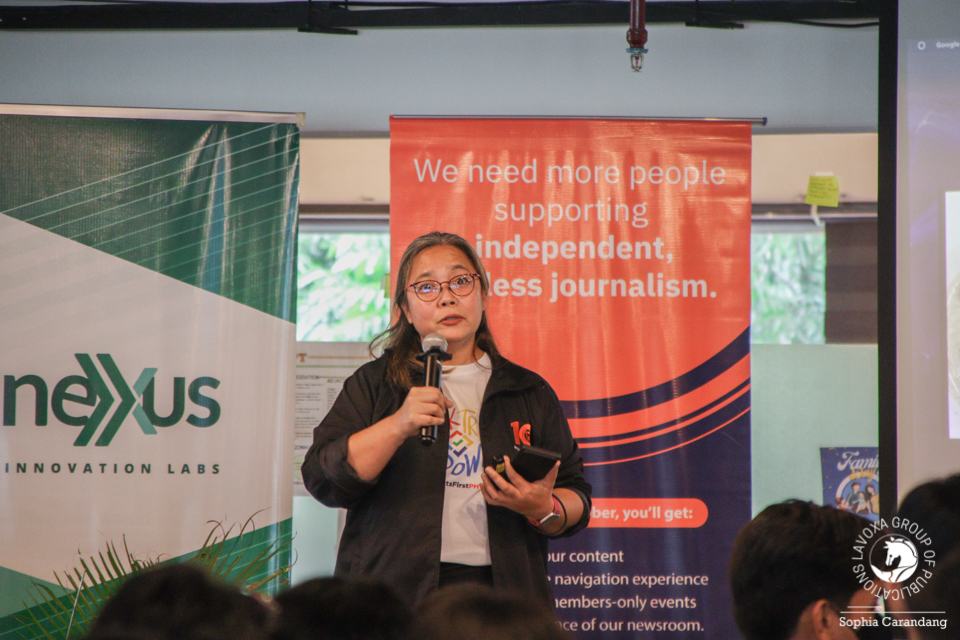
“All of these tools are out there. Dati n’on, madali i-distinguish kung sino ‘yung fake news purveyor kasi hindi siya maayos, [pero] ito hindi eh, napaka-professional. […] All of those things, they have real-world impact,“ Mendoza said.
Mendoza went on to describe one of its alarming influences on the actual world, particularly on individuals committed to promoting truth, using media practitioners as an example.
“On the other side of it, ang [nagiging] kontrabida ay yung mga journalists na nagsasabi na ‘mali yan, ganito, ganyan’, ayon ina-attack. That space has become a space where journalists are being attacked,” she said.
Emphasizing the various opportunities, potential, and risks of the digital space, Mendoza said it was time for everyone to start becoming more conscious of their digital use.
“There [are] so many opinions, there are so many types of individuals. Isipin niyo buong mundo, lahat yan nagta-try mag-communicate in one space. […] Now, potentially something I say could affect millions. […] What does it mean? Everybody can publish. […] So watch out within boundaries and be very conscious,” she said.
As active end users of the digital world, Mendoza noted that there are things that can be done to counteract disinformation, such as initiatives like the #FactsFirstPH movement that centers around education in the digital space.
Building a supportive environment for facts
A panel discussion that focused on the role that a community plays in fostering a support system for facts followed afterwards, which was moderated by Samantha Bagayas, Rappler’s head of civic engagement.
The panelists consisted of Mendoza along with Jairo Bolledo, Rappler’s multimedia reporter; April Marquez, the Department of Interior and Local Government (DILG) CALABARZON’s local government and operations officer; and Cherie Glo Cabungcal, DLSL’s associate professor.
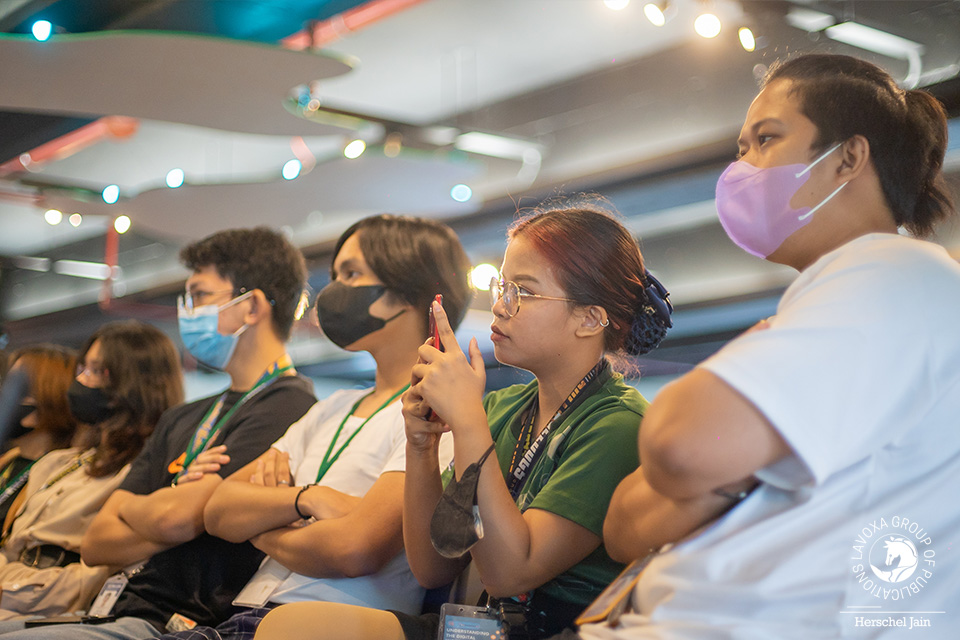
Referencing his own personal experiences in encountering disinformation, Bolledo shared how it affects people’s lives, especially during calamities and disasters.
“Disinformation is a threat to democracy. I’ve seen that firsthand during my coverage sa Taal eruption. […] Meron akong nakausap doon na they chose to stay in their area kasi hindi naman daw sila nakakareceive ng information and nabasa daw nila sa Facebook na ‘safe’ naman daw,” Bolledo said.
He further emphasized that everyone should grab the opportunity to help their community in obtaining proper and factual information if given the chance.
Further into the discussion, the panel shared opinions and expertise on what a community should consider or implement to make credible information more accessible to people, based on what an individual knows and can do.
For Bolledo, humanizing information is crucial in order to avoid the indifferent outlook of the masses on facts and figures.
“Hindi siya masyado naco-communicate so the challenge is, sa lahat ng stakeholders, hindi lang sa media, [pero pati na rin sa] estudyante, government, academe, in our own ways, we have to speak the language of the people. I think ‘yun ‘yung key d’on, […] kailangan i-humanize natin ang mga bagay-bagay,” he said.
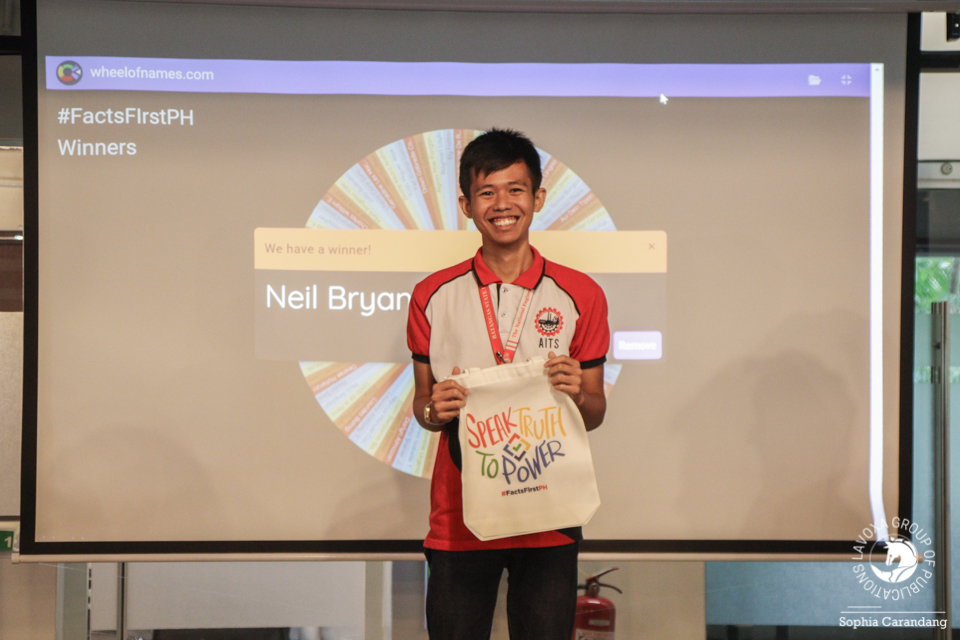
Similarly, Cabungcal said that it is a responsibility for everyone to build a digital world grounded in facts by researching, verifying, and humanizing knowledge in order to be media and information literate.
“I believe each one of us has our own responsibilities. […] Walang maliit or malaking tao pagdating sa commodity ng information because lahat tayo gagamit, lahat tayo magpo-produce ng information. So each one of us should be media and information literate,” she said.
Meanwhile, Marquez answered that it is important to triangulate information given that there is a huge number of data that can be consumed online.
“We [should] always triangulate. Marami pong data. […] As consumers, hindi lang nagbabasa ng Rappler, even other platforms binabasa ko. […] Kapag alam po natin lahat ng facts na yon, mas naggenerate natin yun relevant news para sa atin,” she said.
Mendoza, on the other hand, advised everyone to recognize that the media and the government both play critical roles in ensuring that facts are accessible to all and that these necessary roles are for everyone’s welfare.
***
The first session of #FactsFirstPH was participated by 106 student representatives from various schools and organizations in the province of Batangas.
It was co-organized in partnership with the Department of Interior and Local Government (DILG) CALABARZON, the Local Governance Regional Resource Center (LGRRC), De La Salle Lipa, and the LAVOXA Group of Publications.
Article by: Sofia Cadelino

